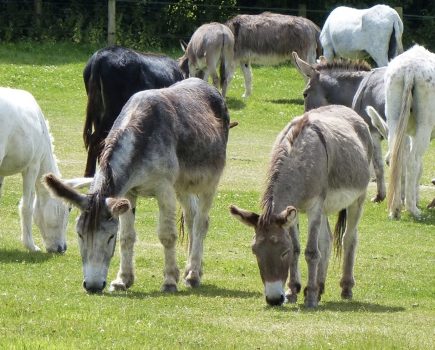Promotional feature: Things such as the weather, harvest and suchlike can change very quickly though, so careful planning is always advisable. Read on for some helpful advice from experts at Farmgate.
It’s time to reflect on plans for the year ahead, and ensure that your livestock is well cared for during the winter
As another year comes to end, it’s a perfect time to consider the challenges and opportunities ahead.
With feed prices falling back during the last half of the year, your animal / bird finishing profitability will undoubtedly be more encouraging for the forthcoming year.
Things such as the weather, harvest and suchlike can change very quickly though, so careful planning is always advisable.
The lambing season should be under way by now for some of you and, as turkey season comes to an end, we need to prepare for a whole new hatching season.
There are always day to day jobs when running a smallholding, but there are also seasonal jobs that can be more time consuming and need more thought.
Poultry
Prepare your breeding plans for the year ahead. Cages, brooders and pens should be cleaned /built and ready for the hatching season. Ensure your hen house is warm and free from draughts. Your well-kept pullets should be in full lay by now, but ensure they are getting extra corn during the evening as they will be cooped up for that bit longer during the dark nights. Don’t let them out during bitterly cold wind, rain and frosty weather. If you do, make sure you provide them with suitable shelter, hay bales, a tarpaulin or something similar.
Pigs
During the winter months, you will need to keep a close eye on your pigs’ bedding as they tend to have a reluctance to venture out to urinate during the colder months. Pigs are very clean animals and, as a rule, don’t like to mess their beds up, but when it comes to a choice between that and walking through a cold, rainy blizzard to go and do their business, you can guess which wins.
Your pig must always have water regardless of how cold it is outside. Snow is not considered an adequate supply of water and neither is ice. A pig would have to eat a bucketful of snow to get an adequate drink and their stomach isn’t made to hold that.
CATTLE, SHEEP & GOATS
Paying greater attention to your livestock’s nutritional and environmental needs is a must during winter. Poorly ventilated housing can cause respiratory infections and can also cause the spread of viral infections. Sheep must be shorn at least once a year. During winter months, ewes must not be turned out within two months of shearing. Even after this time, adequate shelter must be provided, and ensure draughts and cold stress are avoided.
Assess your cows’ body condition coming into winter. They should be fed to maintain or regain a moderate condition that will assist them to withstand the bad weather without loss of production. Cows will need extra feed to keep warm during the winter with hay or supplement early in the day to give them a little helping hand to get going.
MORE: For further information please contact our Sales Support: 08456 711206 or email: info.farmgate@forfarmers.eu or visit our website: www.forfarmers.co.uk
Image(s) provided by:
Archant







